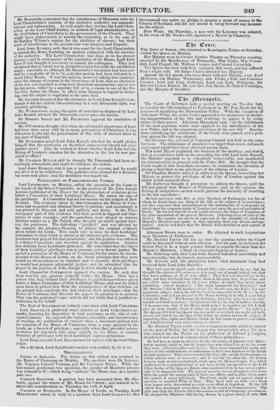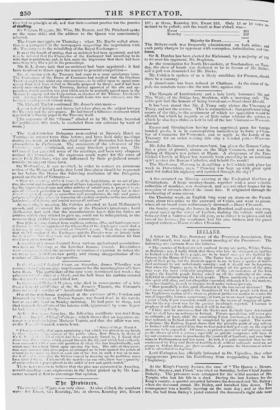Vie illetropolLs.
The Court of Aldermen held a special meeting on Tuesday last, to consider the bill introduced to Parliament by Mr. Fox Manic for the purpose of regulating the Metropolitan Police. With the exception of Alderman White, the entire Court appeared to be unanimous in declar- ing disapprobation of the bill, and resolving to oppose it by every means in their power. Alderman Humphery said, "all the inhabitants of the most populous wards were opposed to the introduction of' the new Police, and to the monstrous provisions of the new bill." Resolu- tions embodying the sentiments of the Court were passed, and a peti- tion against the bill was adopted.
On the same day, a Court of Common Council was held on the same business. The attendance of members was larger than usual, and much excitement might have been observed among them, The Lord Mayor explained the business of the meeting ; and stated, that at a conference held on the preceding day with Lord John Russell, the Minister appeared to be completely immoveable, and manifested his determination to proceed with the Police Bill. He thought that the Court ought to take immediate measures to counteract the intention of giving a fatal blow to the privileges of the citizens of London.
Sir Claudius Hunter moved an address to the Queen, beseeching her Majesty to protect the privileges of the City of London against the attack which menaced them.
Mr. Galloway thought it premature to address the Queen, until the bill had passed both Houses of Parliament ; and, in his opinion, the feeling of indignation excited would prevent the necessity of resorting to the last expedient— He had conversed with fifty or sixty Members of Parliament, but few of whom, he found, knew any thing of the bill, or the subject of its provisions ; and they expressed their astonishment at the introduction of so desperate an attack upon the corporate rights of London, and upon the germinal principles of liberty. He trusted that time Court would convinee the House of Commons of time gross misconduct of the present Ministers. (Cheering from all sides of the Court.) His surprise was not to be expressed at the absurdity of which her Majesty's Ministers were guilty in thus opposing their best friends and sup- porters. And he well knew that Sir Robert Peel chuckled at such a proof of ingratitude.
Alderman Brown rose to order. He objected to such imputations upon Members of Parliament.
Mr. Richard Taylor did not see how the question before the Court could be discussed without such allusion. For his part, he believed Sir Robert Peel to be a much greater friend to popular freedom than her Majesty's Ministers. (Much cheering and clapping my' Itands.)
Mr. Galloway said, that Lord John Russell had acted unworthily and unwarrantably, but, he trusted, unsuccessfully.
Mr. Stevens said, the deputation knew what treatment they had received from Lord John Russell— They had seen the placid smile of Lord John, who seemed to say that he thought the citizens of L;o were very good sort of people indeethlgnit in that
they knew nothing at all of state affairs. They had seen him iu
chair, and they had heard him telling them in his quiet way, to go home and pay a little more attention to their own affairs, of which they might know something. (Great laughter.) "The right honourable the Secretary," said Mr. Stevens, "did us the kindness to tel. us, ' Gentlemen, the Polity is a very important subject, but as tilt' bill has been recommended to the 11,,use by the Committee, and as 1 am pressed by the House to bring it in. why I mast bring it into time House.' The honourable Secretary, however, gave us a very com- fortable and kind assurance: Gentlemen,' said lie, by way of making amends, 6 I do a--sure you, that if the Minis think proper to negative my bill, 1 shall give no more trouble about it either to you or time House.'" (Izzughter.) Mr. Stevens felt that time Queen was in a poiitlon in which she ought not to Ito placed, and that it was the duty of the Court to address her on Rho subject of supporting those rights and liberties which she had sworn to protect, Fuld which her Administration were endeavouring. to subvert.
Mr. Richard Taylor could eeense a leaning towards arbitrary power on the part of Tories, but his disgust. was irrepressible when the amen who turned out the Tories on the profession of Liberal riaciples, abandoned and acted in contravention of those principles— lie had been as great an advocate for time observance of patience with Minis- ters as anybody could be, but the longer they were allowed to go on the worse they were. (Great laughter and They never attempted to rectify any abuses in the establishments or institutions in 'their own hands or in the hands oft heir creatures. They never touched time Post-onice or the Customhouse, in which retinue; were so necessary ; and it was but the other Jay the Crown lawyers made an unconstitutional attack upon the Halleas Corpus Act, which might have boat prejudicial had it not been for the interposition of time Lord Chief Justice of the Queen's beimelt, who considered it to be too ,aereil a prin- ciple to be tampered will'. The present measure was an attempt to take away trainthe people the management of their morn affairs, and to place them under the control of secret individuals. The Court ought not to quarrel about a question its regarded Whig or Tory. They knew that on both sides there- were honest men, determined to resist every effort at despotism. By the bill wiielh they denounced, every thin:, was to be vested in Commissioners. Time plan was what the French called burcauism—a sort of whispering government_ liecharged the Ministers with having shown, by a great variety of acts, that they had no principle at all, and that their constant practice was the practice of shuffling.
Sir William Heyaate, Mr. Wise, Mr. Rogers, and Mr. Pritchard spoke on the same side ; and the address to the Queen was unanimously adopted.
The Court met again on Thursday ; when Mr. Baylis called atten- tion to a paragraph in the newspapers respecting the negotiation with the Treesury es to the rebuilding of the Royal Exchange— It went the length of stating, that an architect had been appointed, and left it to be inferred that the Chancellor of the Exchequer had something to do with that appointment, and, in fact, made the impression that there had been something very likc a job in the proceedings.
Mr. R. L. Jones said that no architect had been appointed: it had been resolved to throw open the matter to general competition— The it:-:-union with the Treasury had come to a most satisfactory issue. The Conaaittee of the 1-louse of Commons had resolved that the Gresham Trustees etlr!,t not, under any circumstances, to be called upon to spend more money tl.:m i•rd been at first so liberally proposed by them ; and it had been eletaly meieestoed that the Treasury, having approved of the site and ap- proaches, wochl sant Lion any plan which might be mutually agreed upon by the Mercer:: C,,mp:my and the Corporation, as trustees of Sir Thomas Gresham's is ilt. Ali 1k:a Ha: fireSiialn Trustees could desire was now attained, and the business eelad Forced without delay.
'air. Elea:el-el Taylor confirmed Mr. Jones's statement— A gr. at deal of intrigue and finesse had taken place on the subject between the Tre-sary and the newspapers. He had traced a fhllacious statement which appeared in it Sunday paper to the Treasury itself.
[An exposure of the "finesse" alluded to by Mr. Taylor, intended for publicetion this week, is excluded from our columns by want of room.]



























 Previous page
Previous page